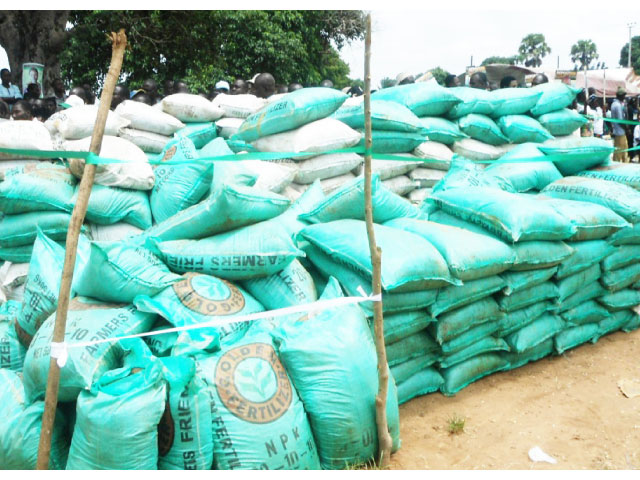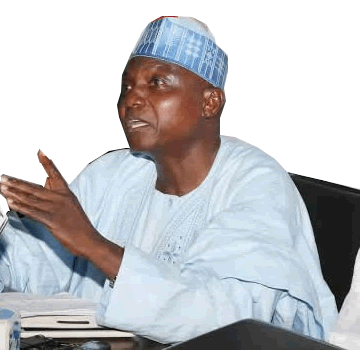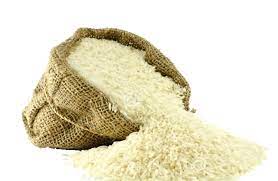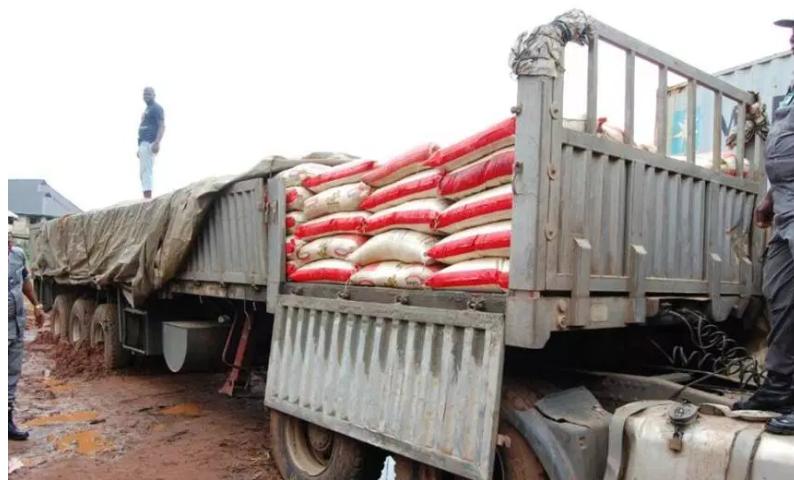Agriculture
Rice Festival and Buhari’s Obsession with Agriculture

By Khalifa Nuruddeen Abande
President Muhammadu Buhari’s exclusive interview to Channels Television means different things to different groups of people across the world. In the interview, the President revealed so many things that have a deepening impact on the country.
While the politicians concentrated on Buhari’s take on his successor, the Igbo about Nnamdi Kanu, National Assembly members about new electoral law, the governors’ state police, my take as an ordinary Nigerian was the president’s take on the economy and agriculture in particular. Many Nigerians were appalled by Buhari’s bold, blunt and no-barrel insistence that agriculture is the magic wand that will catapult the country to the dream land – and Nigerians must go back to farm to make that a reality. He added that his administration in the last six years has invested trillions into agriculture financing. And Nigerians must key in to the project for the country to stand tall as an emerging world power. Many think that the president is too obsessed with agriculture, that is he is herding everyone to the farm. The president wondered why only 2.5 percent of Nigeria’s arable land is being used for agricultural purposes. He told the Channels crew that, “If we invest more in agriculture, people won’t be shouting of unemployment.” He explained that “Now in Nigeria, we produce the rice we need and we even export,” adding that, “we have to exploit our capacities.” President Buhari never hides his plans to make Nigeria self-sufficient in food production. On August 7, 2015, a few months into his administration, he reiterated this stance during a meeting with President of the International Fund for Agricultural Development (IFAD), Dr Kanayo Nwanze, at the Presidential Villa, Abuja. The president said, “It’s time to go back to the land. We must face the reality that the petroleum we had depended on for so long will no longer suffice. We campaigned heavily on agriculture, and we are ready to assist as many want to go into agricultural ventures.” It is an open secret that the president fulfilled that promise by investing hugely on agriculture through the Anchor Borrowers Programme (ABP), superintended by Chief Godwin Emefiele-led Central Bank of Nigeria (CBN). What many Nigerians failed to do was to check how other countries with similar demographics as Nigeria’s are doing. For a start, it is an incontrovertible fact that the most populous nations on earth invest heavily on agriculture and deploy a larger percentage of their population to agriculture. Buhari is not saying anything new. About 35 percent of China’s 1.41 billion population are directly involved in agriculture. This means that 490 million Chinese are involved in agriculture. The figure is higher for India, another super power in terms of population. Over 58 percent of 1.39 billion Indians are directly involved in agriculture. By this, 738 million Indians are into farming. We shouldn’t crucify Buhari when he repeatedly said: “But as I said, look at the vastness of Nigeria, only 2.4 percent of the arable land is being used. We realized it rather too late. We have to go back to the land.” Many of the president’s critics are oblivious of the demographic projections which show that the Nigerian population might experience a constant increase in the next decades. By 2050, it is forecast that the population in Nigeria will double compared to 2019, reaching over 400 million people, according to the World Bank. Who will feed these huge numbers if we don’t go back to land as Buhari is advocating? Even the most developed nations like America are engaging more of its citizens into agriculture. The percentage of Americans involved directly in agriculture was just 1.3 percent in 2020, but another 8-9 percent was involved in the value chain of agriculture. Even a world power with all the technology is engaging at least 10 percent of its population into agriculture, why should Nigeria fold its arms and watch? Unlike his predecessors, Buhari’s obsession with agriculture is real, not rhetoric. The president matched his words with actions as can be seen from the unprecedented investments he has been doing in the last six years through the CBN’s ABP. These investments are bearing fruits as evidenced from the millions of poverty-stricken peasants who have now been economically empowered. As part of the agricultural revolution, President Buhari would on Tuesday, January 18, 2022, unveil the world’s largest rice pyramid in Abuja. This is no small feat to the country. Through ABP, the president had invested billions on ABP through the CBN on over 15 agriculture commodities. These commodities include maize, sorghum, millet, cassava, cocoa, rice, cotton, ground nuts, sugarcane, tree crops, legumes, tomato, to mention a few. Before Buhari’s election in 2015, it was an open secret that Nigeria’s local rice (the country’s staple food) production was 1.5 mts /hectare. Courtesy of ABP now, the local rice production has soared to 5 mts/hectare. The impact of this soaring figures of rice production can be seen from the number of large-scale integrated rice mills which had increased from less than 10 in 2015 to nearly 100, 400 medium sized mills and over 200,000 small scale mills across the country, providing millions of direct and indirect jobs. In terms of farming alone, there were about 1.5 million rice farmers six years ago, but the number has snowballed into over 20 million now – all thanks to Buhari’s ABP. In fiscal terms, before Buhari’s coming, the federal government spent huge money to stop rural urban migration. Now ABP makes urban- rural migration cost free. ABP’s beneficiaries are traceable and verifiable. All the millions of farmers that benefitted from ABP can be traced through their genuine house addresses, NIN-registered mobile phone numbers, BVN, photographs, transaction history, among other incontrovertible data. Before the introduction of ABP, the CBN was spending about $1.8 billion forex on rice import alone every year. This translates to about N747 billion in today’s official exchange rate of N415/$. By this, the CBN, courtesy ABP, is saving the trillions of naira that were hitherto expended as import bill. This is a breakthrough that even Buhari’s bitterest enemies are saluting him. By foregoing, if not for anything, Nigeria was saved from the challenge of sourcing forex or devaluing our currency to finance this monstrous import bill. Official data indicate that the ABP has added six million metric tons to rice supply in the country and created nearly six million direct jobs in a year; at the same time, about two million indirect jobs are created in a cropping season. Nigeria now has three cropping seasons in a year, all of them fully funded by the ABP loans. These jobs are restricted to only the production side of the rice value chain, and does not include millions of other jobs created in the processing, packaging, transportation, marketing sectors of the rice ecosystem. Not the least of which is the jobs and wealth created in the input supplies segment. On the international scene, Buhari’s agricultural revolution has burnished the country’s image more than any diplomatic adventure so far. It was a source of pride for all Nigerians that in 2021 our country topped South Africa and Egypt – as Africa’s number One Rice producer, and emerged 29th on the list of Top 50 biggest contributors to the global GDP, leaving UAE, Norway, Israel, others behind. Buhari’s obsession with agriculture saved Nigeria from food calamity, particularly during the COVID-19 pandemic that shut the entire world. There would have been mass starvation and numerous deaths. Many experts were worried when the unprecedented horror of COVID -19 pandemic permeated all contours of the world, leaving mass fatalities, which necessitated lockdown of borders and cessation of shipment of commodities and goods. With Buhari’s foresight and political goodwill, however, Nigeria like other nations shut down its borders and banned rice importation. It was on record that despite the global lockdown, Nigeria was still feeding itself with the food produced by its farmers and even exporting to other African countries. This is a milestone that Nigeria must sustain and improve upon. Imagine if we had relied on food imports, where would the 200 million Nigerians get food from when the entire world was on lockdown for nearly a year? Through ABP, the CBN, also funded supply of farm inputs that include fertilizer, herbicide, seeds, pesticides, among others. As a result of the agricultural revolution championed by ABP, the farm inputs sub-sector in Nigeria has witnessed an unprecedented growth. For instance, in fertilizer manufacturing alone, Nigeria has since achieved self-sufficiency. From a mere three comatose blending plants in 2016, Nigeria now boasts of over 47 state- of- the- art fertilizer blending plants across the country. Fertilizer importation is now ancient history. In the area of herbicides, Nigeria is better off now compared to 2015 before the ABP’s regime. The country has indigenous mega herbicide manufacturing companies that include Wacot, Candel, Jubaili, Saro, Marshal, among dozens others. Consequent upon this major breakthrough, is the creation of millions of herbicide distributors spread across the 36 states and 774 local governments of the federation and the FCT, serving farmers and creating wealth. This brings to the fore the reasons why Nigerians must embrace President Buhari’s clarion call to embrace agriculture and return to farm.Abande, writes from Kano, and can be reached at aasiia@yahoo.com
Agriculture
Experts urge Media to Present Information on Genetically Modified Foods Objectively

The National Biotechnology Research and Development Agency (NBRDA) has urged the media to stand in the communication gap in favour of biotechnology development n Nigeria, re-affirming the safety in the consumption of genetically modified foods.
Prof. Abdullahi Mustapha, Director General/Chief Executive Officer of the agency, affirmed this during a one-day media field trip to NBRDA FARMS on Monday in Abuja.
The trip was organised by Open Forum On Agricultural Biotechnology (OFAB), an initiative of the African Agricultural Technology Foundation (AATF).
“Today, you shall be visiting our TELA Maize farms. This provides an exciting opportunity to see for yourselves what we have been doing here and equally gather your findings on what you have seen today and then take back the message to the people to quell some of the miscommunications about Genetically Modified Organisms (GMO) crops.
“TELA Maize hybrid varieties were developed to address some of the pressing challenges facing our farmers, including pests and diseases that can significantly reduce crop yields,” he said.
According to him, the production of the TELA MAIZE hybrid was done through the combined efforts of scientists at the Institute for Agricultural Research (IAR), Zaria in collaboration with stakeholders in key institutions such as NBRDA, NBMA, NASC, and the AATF Research Team.
“We are here to showcase our demonstration farms of genetically modified versions of commonly consumed crops developed by our scientists that have enjoyed rave reviews from the global world of science and the agricultural sector.
“These experts have worked tirelessly to ensure that this crop is not only high-yielding but also safe for human consumption,” he added.
He noted that the National Biosafety Management Agency (NBMA) has been instrumental in ensuring the safety and efficacy of TELA Maize which is believed to have the potential to transform the agricultural landscape in Nigeria and beyond.
Dr Jean Baptiste, the Regional Representative of the African Agricultural Technology Foundation, said that GMOs were aimed at leveraging the potential of biotechnology to develop a system that will help farmers.
He said Tella maize is a variety, developed using biotechnology methods to control insects.
“It also checks the resistance to drought and controls army worms, and stem borers in maize.
“At the end of the day, the benefits are enormous because it helps farmers increase yield and to be able to meet food security issues.
Dr. Francis Nwankwo, a TELA MAIZE developer from the African Agriculture Technology Foundation (AATF) explained the processes saying Tela maize passed through a genetic transformation that happens at the DNA level .
“They are not manufactured. What happens is we identify genes that can inhibit the infestation or reduce the infestation of some lepidoptera pests that affect some crops.
“So when we identify those genes we incorporate them into the DNA of maize thereby making it the maize, plus the genes.
“That way we increase the genes and reduce the struggles that our conventional maize go through on our farms like the stem borrower and others,” he said.
In her presentation, Dr Rose Gidado, Director, Agricultural Biotechnology Department, NBRDA, explained that many countries have derived huge benefits from TELA maize citing countries such as the U.S. and Canada.
“We actually brought you here so you could see the disparities between the TELA MAIZE and the non-TELA MAIZE species, and the environment which is far different from what we see on social media.
“We have other crops like beans that have actually been through the same gene transfers and are doing perfectly well and are safe for consumption,” she said.
She, therefore, urged the media to be on the guard in view of a lot of misinformation going round on social media and take responsibility in providing related information to the public adequately and objectively. (NAN)
Agriculture
Epe LG Empowers 200 Farmers to Boost Food Production

Ms Surah Animashaun, the Chairperson, Epe Local Government, has empowered 200 farmers with cash and other agricultural inputs to boost food production in the area.
Animashaun distributed the agricultural inputs to the beneficiaries at the council secretariat in Epe on Thursday in Lagos.
She said the initiative was aimed at supporting farmers in order to boost food production in the various communities of the council.
Animashaun said the farmers who benefitted from the gesture are expected to be considerate in their price fixing after harvest to ensure the affordability of food for all Nigerians.
“With the economic situation now and the support being giving to you, farmers should be reasonable in fixing prices after harvest to ensure that ordinary Nigerians source food at a more convenient price nationwide.
“We are here to give you support for your farming activities today, we expect that you reciprocate tomorrow by selling at a more affordable price to the people tomorrow,’’ she said.
Animashaun explained that each of the benefiting farmers received N50,000 and essential grains such as maize and sorghum.
She said the council would continue to support the farmers for them to be strong in farming activities.
Animashaun also used the medium to highlight her administration’s ongoing efforts in the extension of palliatives to other sectors of the economy.
She urged the communities in the area to maintain harmony, love, hospitality, and compassion, particularly in the face of the present economic challenges.
Also speaking, Mr Sikiru Owolomoshe, the Vice Chairman of the council, urged the farmers to take advantage of the gesture to improve their activities in order to encourage others.
Mr Olayinka Kazeem, the Secretary of Epe Farmers and a beneficiary, expressed gratitude to the council chairperson and her management.
“This is the first time we are witnessing this kind of programme and it is coming at a critical period when many states are facing food shortage,’’ he said.
He assured that the beneficiaries would do their best to ensure the objective was achieved.
Mr Ahmed Surakat, the Public Relations Officer of Lagos State Fishermen Cooperative Association, and Mrs Kafilat Animashahun beneficiaries, extended their gratitude to the council chairman for her unwavering support to farmers.
Earlier, the President of the Epe Farmers Union, Mrs Aminat Shabi, lauded Animashaun for the comprehensive support to other agricultural value chain such as fish farmers and livestock producers.(NAN)
Agriculture
Food Security Achievable Through RAAMP, Says National Coordinator

By Tony Obiechina, Abuja
The Rural Access and Agricultural Marketing Project (RAAMP) has been described as an appropriate and very effective means of realising food sufficiency and security across the country.
The National Coordinator of RAAMP, Engr Aminu Bodinga Mohammed who made the assertion during the 7th Joint World Bank and French Development Agency Implementation Support Mission of RAAMP at the Shehu Musa Yar’Adua Centre, Abuja, pointing out that most urban centers derive their supply of food from farms, which are located at the rural communities.
His words: “the primary objective of RAAMP is to improve rural roads and trading infrastructure through to boost food production.
Therefore the successful implementation of this project could go a long way towards guaranteeing food sufficiency and security across the country”.He solicited for concerted efforts by all stakeholders to ensure an all-round success of the project.
Aminu noted that the mission was to evaluate the current implementation status, milestones as well as challenges faced by the 19 states participating in the project and announced that arrangements had reached an advanced stage for the commencement of civil works on agro-logistics centers (ALCs) latest by September, 2024 with 23 major contracts that would be awarded across the states.
ALCs refer to market hubs that have been prioritised for transformation to ultra-modern standards at various locations across the country , notably in rural communities to empower and enhance the livelihoods of the people.
Also speaking, the Task Team Leader of the World Bank, Mr. Rakeesh Tripathi hinted that a scale-up was being mooted for the project but emphasized that only states which must have established and operationalised the Rural Access Road Agency (RARA) and State Road Fund (SRF), backed up with the required standing on counterpart funds would be eligible to access the scale-up funds.
He therefore advised all states to take advantage of the mission and get the needed support to tackle every challenge facing their State Project Implementation Unit (SPIU), adding that all the 36 states and the Federal Capital Territory would be encouraged to embrace the scale-up project.
Highpoints of the exercise were presentations by the State Project Coordinators of the respective participating states, question and answer sessions, comments and observations, among other inputs by the stakeholders.
The Task Team Leader of the French Development Agency, AFD; Consultants from the World Bank; the Federal Project Management Unit, FPMU as well as State Project Implementation Units, SPIUs of RAAMP also attended the mission.




























